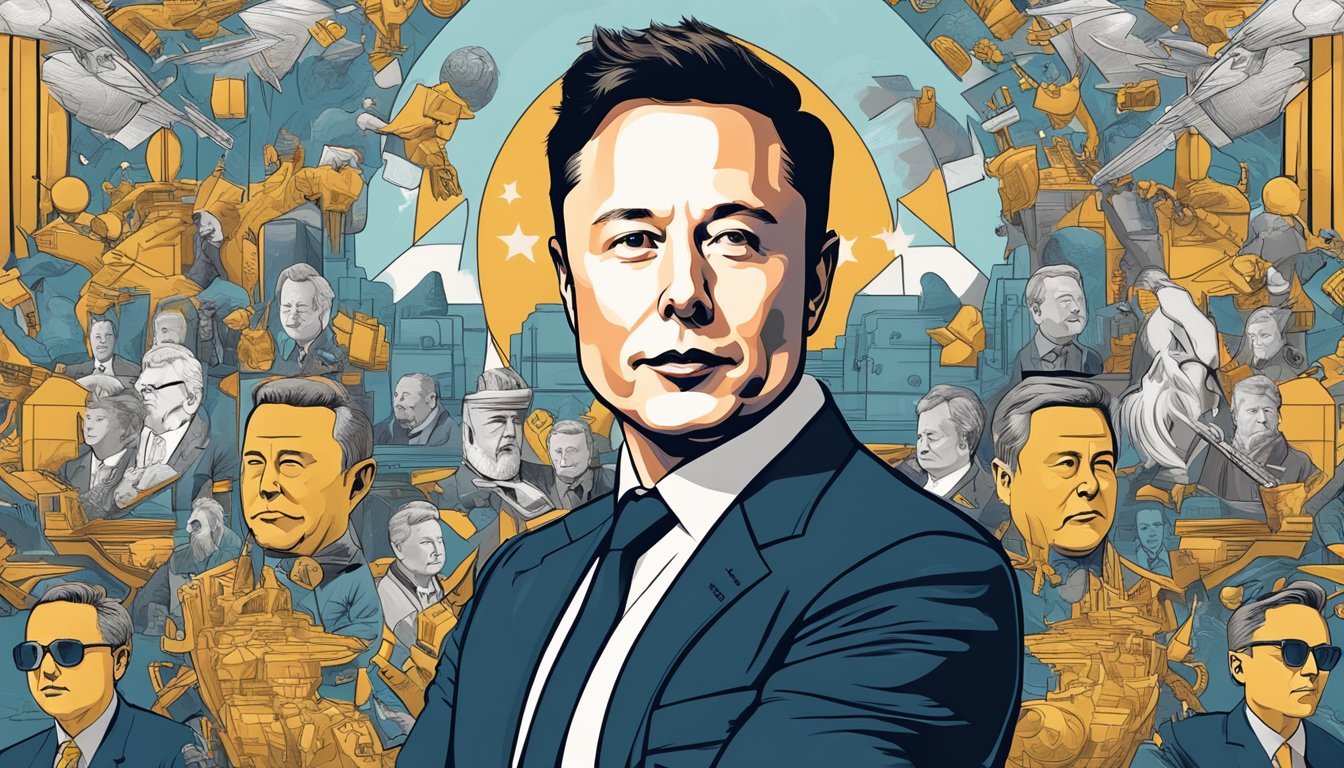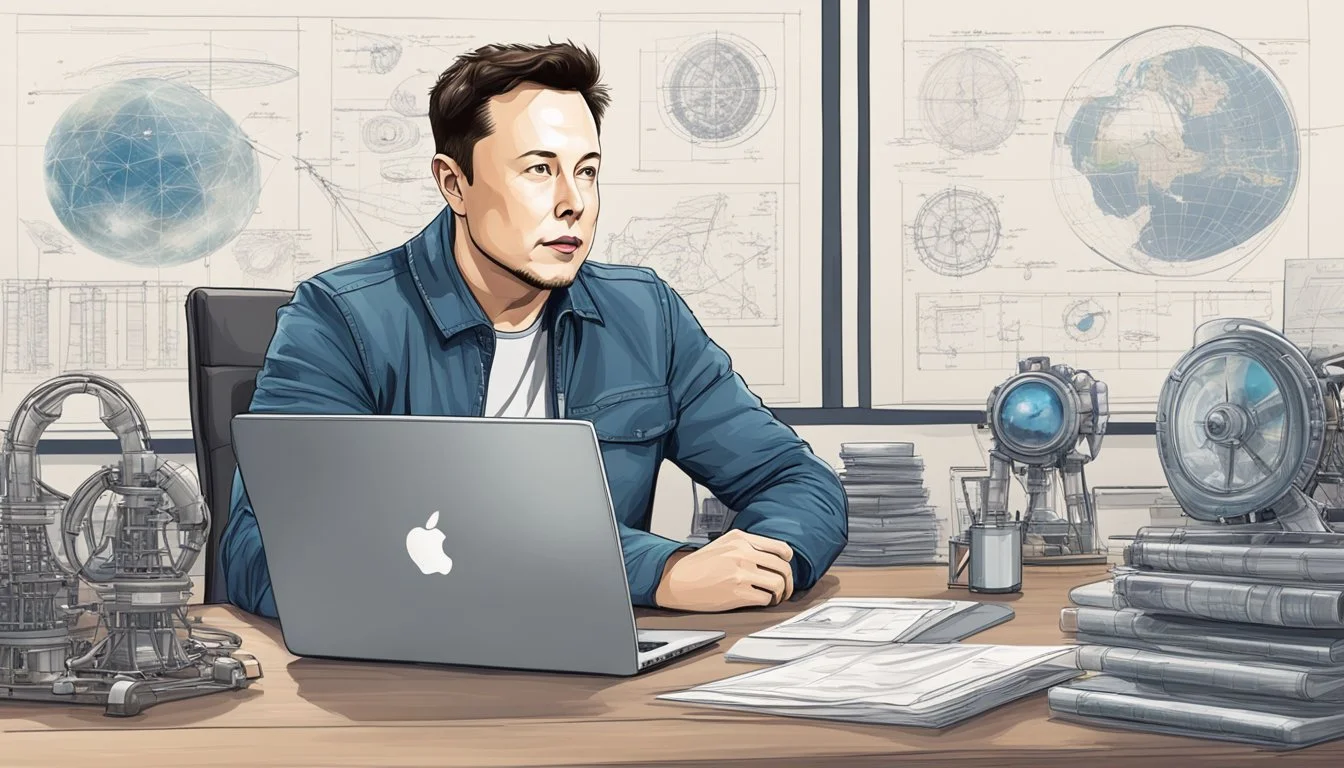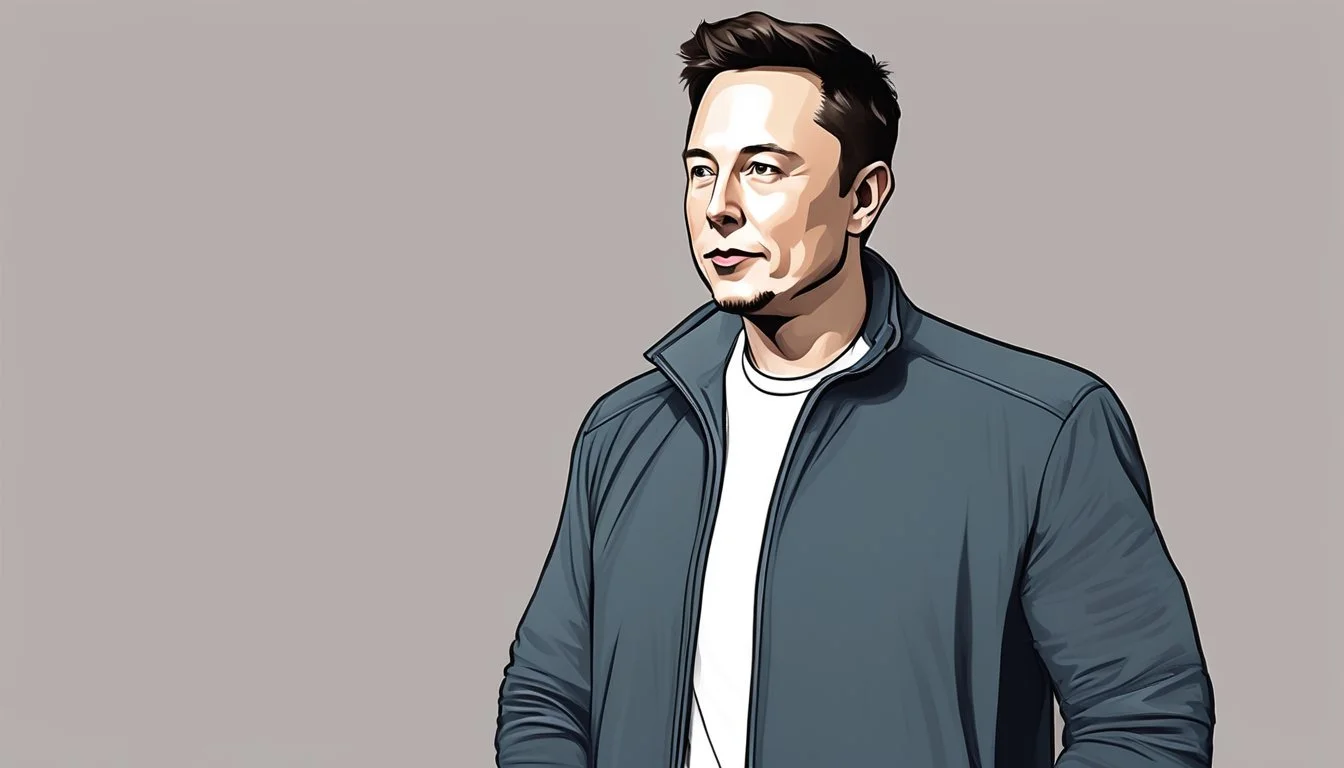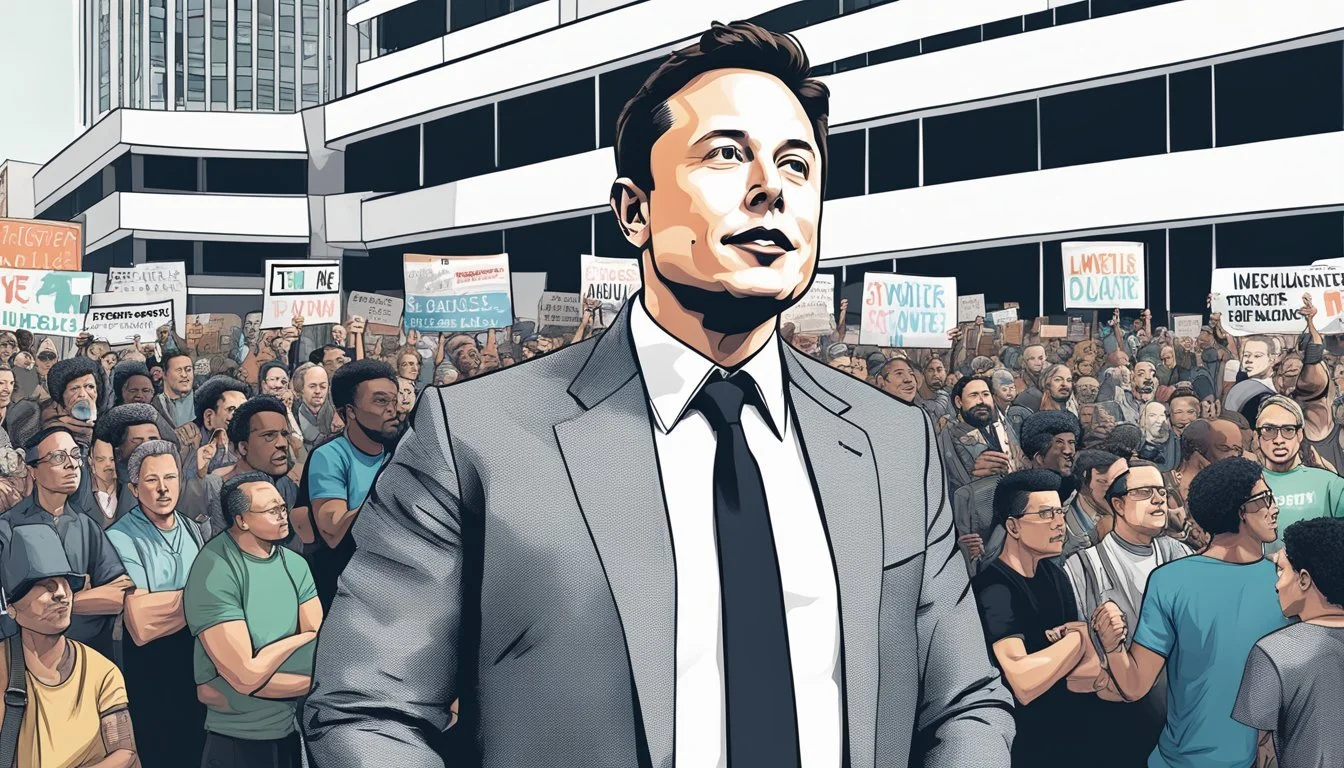8 Unexpected Elon Musk Political Stances
Tech Billionaire's Surprising Views Revealed
Elon Musk, the tech entrepreneur and billionaire, has become a prominent figure in political discussions. His views and statements often spark debate and attract attention from across the political spectrum. While some of his positions align with traditional party lines, others defy easy categorization.
Musk's political stances have evolved and shifted over time, sometimes in unexpected ways. His comments on social media and public statements provide insight into his thoughts on various issues. From technology regulation to social policies, Musk's opinions have influenced public discourse and occasionally impacted financial markets.
1) Supports Universal Basic Income
Elon Musk has expressed strong support for universal basic income (UBI) as a potential solution to economic challenges posed by automation and artificial intelligence. The tech entrepreneur believes UBI will become essential as robots and AI systems increasingly replace human jobs and perform mundane tasks.
Musk's advocacy for UBI stems from his perspective on the future of work. He anticipates significant job displacement due to advancements in technology, particularly in sectors vulnerable to automation.
As the CEO of companies like Tesla and SpaceX, which are at the forefront of technological innovation, Musk has firsthand insight into the potential impacts of AI and robotics on employment. He sees UBI as a necessary measure to support workers whose jobs may be replaced by machines.
Musk's stance on UBI aligns with his broader vision of the future, where technological progress may necessitate new economic models. He views it as a practical approach to address potential societal challenges resulting from rapid technological advancements.
While Musk's political views often defy simple categorization, his support for UBI represents a consistent position he has maintained over time. This stance demonstrates his consideration of long-term societal impacts of the technologies his companies are developing.
2) Opposes Net Neutrality
Elon Musk has taken an unexpected stance against net neutrality regulations. This position surprised many, given his technology-focused businesses and reputation as an innovator.
Musk believes that market forces, rather than government regulations, should shape internet services. He argues that net neutrality rules could stifle innovation and investment in network infrastructure.
The Tesla CEO has expressed concerns that strict regulations might limit the development of new internet technologies. He suggests that a free market approach could lead to more efficient and cost-effective internet services.
Critics of Musk's position argue that without net neutrality, large internet service providers could prioritize certain types of content. This could potentially create an uneven playing field for smaller companies and startups.
Despite the controversy surrounding his stance, Musk maintains that competition and consumer choice are better drivers of internet equality than government mandates. He believes that technological advancements and market pressures will naturally lead to fair internet access.
Musk's opposition to net neutrality aligns with his broader skepticism of government intervention in business and technology sectors. This stance reflects his preference for entrepreneurial solutions to societal challenges.
3) Advocated Carbon Tax
Elon Musk has repeatedly voiced support for implementing a carbon tax. He views this measure as a crucial step in addressing climate change and transitioning away from fossil fuels.
At a CEO summit in December 2020, Musk emphasized the need for government action on climate issues. He argued that a carbon tax would be an effective way to incentivize businesses and individuals to reduce their carbon emissions.
During Tesla's first-quarter 2021 earnings call, Musk described a carbon tax as "just common sense." He believes such a policy would accelerate the shift towards sustainable energy sources and technologies.
Musk has cited International Monetary Fund data to bolster his argument. He pointed out that the current situation, without proper carbon pricing, was costing $5.3 trillion annually in environmental and health impacts.
The Tesla CEO's advocacy for a carbon tax aligns with his broader vision for sustainable energy. It reflects his belief that economic incentives can drive meaningful change in addressing environmental challenges.
4) Criticized Brexit Decision
Elon Musk has taken unexpected stances on various political issues, including Brexit. The tech billionaire voiced his opposition to the United Kingdom's decision to leave the European Union.
In 2016, Musk expressed concern about the potential negative impacts of Brexit on business and innovation. He argued that leaving the EU could hamper scientific collaboration and technological progress.
Musk's criticism of Brexit aligned with his broader views on international cooperation and free trade. He emphasized the importance of open borders for talent and ideas to flow freely between countries.
The Tesla and SpaceX CEO warned that Brexit might discourage companies from investing in the UK. He suggested that uncertainty surrounding trade agreements could make the country less attractive for business expansion.
Musk's stance on Brexit surprised some observers, given his reputation for unconventional political views. His criticism of the decision demonstrated his belief in the benefits of economic integration and global cooperation.
5) Endorsed Andrew Yang
Elon Musk surprised many in 2019 when he publicly endorsed Andrew Yang for the Democratic presidential nomination. This marked a rare instance of Musk openly supporting a specific candidate in a presidential race.
Yang's campaign centered on innovative ideas like universal basic income, which resonated with Musk's forward-thinking approach. The tech entrepreneur expressed his support for Yang on Twitter, praising the candidate's understanding of the economy and technology.
Musk's endorsement came as a boost to Yang's campaign, drawing attention from tech-savvy voters and those interested in futuristic policy proposals. The SpaceX and Tesla CEO's backing lent credibility to Yang's platform, particularly on issues related to automation and job displacement.
While Yang ultimately did not secure the Democratic nomination, Musk's support highlighted the candidate's appeal among Silicon Valley figures. It also demonstrated Musk's willingness to engage in political discourse beyond traditional party lines.
This endorsement stood out as one of Musk's clearer political stances, contrasting with his often ambiguous or shifting political positions on other issues. The move aligned with Musk's tendency to support ideas and individuals he views as innovative or disruptive to the status quo.
6) Backed Democratic Causes
Elon Musk has supported various Democratic causes throughout his career, despite his more recent Republican-leaning stance. In the early 2000s, Musk began making political donations to both Democratic and Republican candidates.
He contributed to Barack Obama's presidential campaigns in 2008 and 2012. Musk also donated to Hillary Clinton's 2016 presidential bid, showcasing his willingness to support prominent Democratic figures.
Environmental issues have been a key focus for Musk, aligning with traditional Democratic priorities. His companies Tesla and SolarCity have promoted clean energy solutions, which resonate with many Democratic voters and politicians.
Musk has advocated for carbon taxes, a policy often championed by Democrats. This stance demonstrates his support for market-based solutions to address climate change, a core Democratic concern.
In 2020, Musk made his last known donation to a Democratic candidate, contributing to Senator Chris Coons of Delaware. This marked the end of his bipartisan donation pattern, as he shifted towards supporting Republican candidates and causes.
7) Supports a Carbon Dividend
Elon Musk has expressed support for a carbon dividend system as a market-based approach to addressing climate change. This stance may surprise some, given his role as CEO of electric vehicle manufacturer Tesla.
A carbon dividend involves placing a fee on carbon emissions and redistributing the collected funds to citizens. Musk views this as a potential way to incentivize cleaner energy use while providing economic benefits to the public.
In various interviews and social media posts, Musk has advocated for a revenue-neutral carbon tax. He argues that such a policy could help accelerate the transition to sustainable energy without creating an additional financial burden on citizens.
Musk's support for this approach aligns with his broader views on combating climate change through innovative market solutions. He believes that putting a price on carbon emissions could drive faster adoption of renewable energy technologies.
While some critics argue that a carbon dividend could harm certain industries, Musk contends that it would create a level playing field for all energy sources. He sees it as a way to account for the true costs of fossil fuels and promote cleaner alternatives.
8) Expressed Libertarian Views
Elon Musk has often been associated with libertarian political views. His stance on minimal government intervention and emphasis on individual freedoms aligns with core libertarian principles.
Musk has advocated for free market solutions to various societal challenges. He believes in the power of innovation and private enterprise to drive progress, rather than relying on government programs.
The tech entrepreneur's opposition to excessive regulations demonstrates his libertarian leanings. He has criticized government overreach in areas like automotive manufacturing and space exploration.
Musk's support for cryptocurrency and decentralized technologies also reflects libertarian ideals. These innovations challenge traditional financial systems and promote individual economic sovereignty.
Despite his libertarian inclinations, Musk has described himself as "politically moderate." This suggests a nuanced approach that doesn't strictly adhere to any single ideology.
His views on certain issues, such as climate change and renewable energy, diverge from typical libertarian positions. This highlights the complexity of Musk's political philosophy.
Musk's libertarian tendencies are most evident in his business practices and technological pursuits. He champions private sector solutions to global challenges, embodying the libertarian ethos of individual initiative.
Elon Musk's Environmental Policy Stance
Elon Musk's environmental policy stance has been a mix of strong support for renewable energy and criticism of traditional fossil fuel industries. His views have shaped both his business ventures and public statements on climate change.
Support for Renewable Energy Initiatives
Musk has consistently championed renewable energy technologies. He co-founded Tesla, a company dedicated to accelerating the world's transition to sustainable energy. The company produces electric vehicles, solar panels, and energy storage systems. Musk has also advocated for carbon taxes to incentivize clean energy adoption.
In 2018, Musk called climate change "the biggest threat that humanity faces this century." This statement underscored his commitment to addressing environmental issues. His companies have invested heavily in solar and battery technologies, aiming to make renewable energy more accessible and affordable.
Criticism of Traditional Oil and Gas Sectors
Musk has been openly critical of the fossil fuel industry. He has argued that continued reliance on oil and gas is unsustainable and harmful to the environment. His statements often highlight the need to shift away from these energy sources to combat climate change.
Tesla's success in the electric vehicle market directly challenges traditional automotive companies reliant on fossil fuels. Musk has pushed for government policies that would accelerate the transition away from gasoline-powered vehicles. He has also criticized subsidies for fossil fuel companies, arguing that they hinder the adoption of cleaner energy alternatives.
Views on Corporate Taxation
Elon Musk has expressed strong opinions on corporate taxation, advocating for lower rates while emphasizing their impact on innovation and economic growth. His views have sparked debate and influenced policy discussions.
Advocacy for Lower Corporate Taxes
Musk has consistently argued for reduced corporate tax rates. He believes high taxes stifle business growth and innovation. In 2018, Musk publicly supported the Trump administration's tax cuts, praising their potential to boost the U.S. economy.
The Tesla CEO has criticized countries with high corporate tax rates, suggesting they discourage investment and job creation. He has pointed to examples of companies relocating to tax-friendly jurisdictions as evidence of this effect.
Musk argues that lower corporate taxes allow companies to reinvest more profits into research and development, ultimately benefiting consumers and the economy.
Impact on Innovation and Investment
Musk contends that lower corporate taxes directly fuel innovation. He cites Tesla and SpaceX as examples of companies that have invested heavily in groundbreaking technologies.
The billionaire entrepreneur claims that reduced tax burdens enable companies to take greater risks on ambitious projects. This, he argues, leads to breakthroughs in areas like electric vehicles, renewable energy, and space exploration.
Musk has also linked corporate tax rates to international competitiveness. He suggests that countries with lower rates attract more foreign investment and talent, creating a virtuous cycle of economic growth and technological advancement.
Critics argue that Musk's stance primarily benefits wealthy corporations and shareholders. However, Musk maintains that the long-term benefits of increased innovation outweigh short-term revenue losses for governments.
Thoughts on Free Speech and Censorship
Elon Musk has positioned himself as a staunch advocate for free speech. He frequently criticizes what he perceives as censorship on social media platforms and in traditional media.
Musk's acquisition of Twitter (now X) was partly motivated by his desire to promote free speech principles on the platform. He has described himself as a "free speech absolutist" in public statements.
Despite this stance, Musk's actions have sometimes contradicted his stated beliefs. X has complied with government requests to remove or restrict content in certain countries.
Critics argue that Musk's approach to moderation on X has been inconsistent. Some point to instances where he has restricted speech critical of himself or his companies.
Musk has also used legal action against perceived critics. He has filed lawsuits against groups and individuals who have spoken out against him or his businesses.
These actions have led some to question the sincerity of Musk's free speech advocacy. They argue his support for free expression may be selective or self-serving.
Musk maintains that his goal is to create a digital "town square" where diverse viewpoints can be freely expressed. He continues to defend his decisions as necessary to protect legitimate speech.










